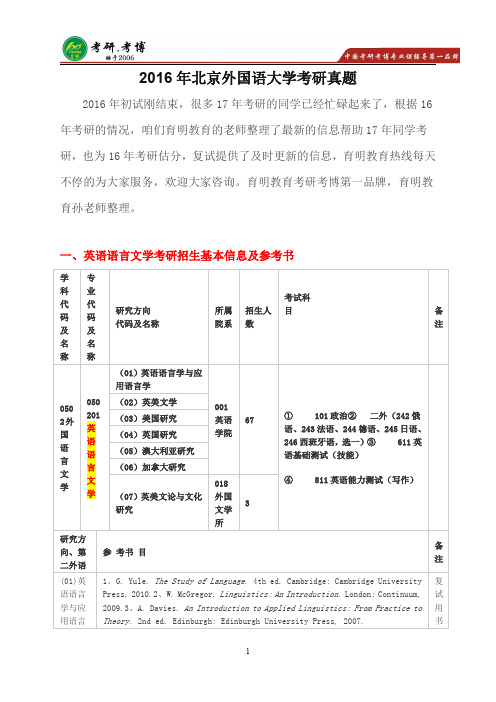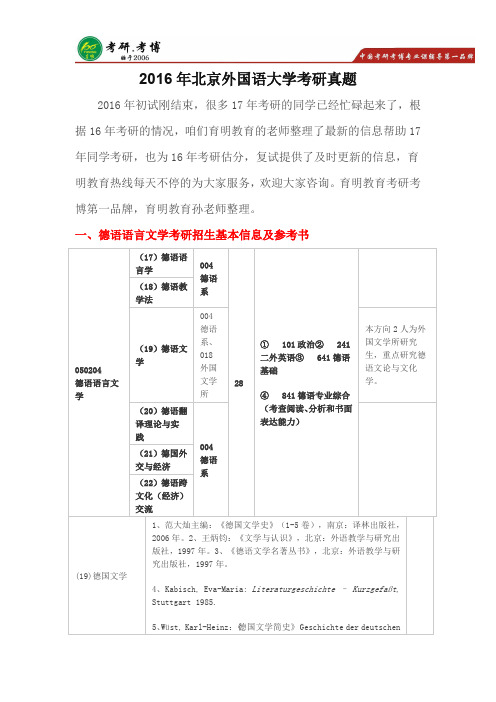才思学员回忆--2017年北京外国语大学语言学及应用语言学考研真题
- 格式:pdf
- 大小:152.79 KB
- 文档页数:2


2002年语言学与应用语言学(100 points)All the questions are to be answered in English on the answer sheets provided.1. Displacement,arbitrariness,productivity,cultural transmission,discreteness and duality are sometimes listed as the 6 core features of human language.Choose 3 out of the 6 and explain with examples what they mean. (12 points)2. Briefly explain what phonetics and phonology are concerned with and what kind of relationsips hold between the two.(10 points)3.In deriving new words via a prefix such as mis-, there seems to be some constraint on what is permitted. The words in the first colum below are acceptable formations,but in the other columns are not.Work out what the rule(s) might be for making new adjectives with the prefix mis-. (18 points)Column I : misadventure misjudgement misplaced mistrustfulColumn II: *mishappy *mismeal *misglad *misroleColumn III: *mismilk *missad *misword *miscrazy4. Using what you know about Grice's cooperative principle and its four maxims,analyze the following short exchange.(20 points)同事甲:小张昨晚去哪儿了?同事乙:今天在早上我看见一辆白色富康停在小林家门口。




北京外国语大学英语学院英语语言文学专业二外法语1995——2009二外德语1995——2009二外日语1995——2009二外俄语1995——2009二外西班牙语1998——2009二外法语(MTI)2010二外德语(MTI)2010二外日语(MTI)2010二外俄语(MTI)2010二外西班牙语(MTI)2010基础英语1995——2010(2000——2009有答案)基础英语(外研中心外语教育、外国语言专业)2007——2010英美文学1995——2010(2002——2008有答案)英美文学(外国文学所)2009英美文学文论与文化研究(外国文学所)2010英语语言学和应用语言学1995——2010(注:1995——1997年称“英语应用语言学”)(2002——2009有答案)美国社会文化研究1990,1995——2010(1990有答案)英国社会文化研究1995——2010澳大利亚研究1995——2010英、汉互译(笔译)(英语学院)2009英语翻译理论与实践(英语学院)1997——2008,2010(2000——2001,2003——2005有答案)英汉同声传译(高翻学院)1998——2008(2002——2005有答案)英汉互译(同声传译)(高翻学院)2009——2010复语同声传译专业试卷(高翻学院)2009——2010英语翻译基础(MTI笔译方向)2010汉语写作与百科知识(MTI笔译方向)2010翻译硕士专业学位(MTI)英汉互译(笔译)2009——2010翻译硕士专业学位(MTI)英汉互译(口译)2009——2010英汉对比与翻译2001高级翻译1995——1997外语教育2008——2009英语教育2002——2007外语语言研究方向专业试卷2008英语综合1985,1995——2002(1985有答案)语言测试2002——2007普通语言学2007普通语言学、外语教学2004——2006(2004——2005有答案)普通语言学及应用语言学(外研中心)2010句法、第二语言习得2003综合考试(含国际政治、汉语)2000——2002英语新闻业务与新闻学基础知识2006——2009国际新闻2010国际法学专业(无此试卷)外交学专业综合考试(含国际政治、汉语)2000——2002中国外语教育研究中心外国语语言学及应用语言学专业二外法语1995——2009二外德语1995——2009二外日语1995——2009二外俄语1995——2009二外西班牙语1998——2009二外法语(MTI)2010二外德语(MTI)2010二外日语(MTI)2010二外俄语(MTI)2010二外西班牙语(MTI)2010基础英语1995——2010(2000——2009有答案)基础英语(外研中心外语教育、外国语言专业)2007——2010英美文学1995——2010(2002——2008有答案)英美文学(外国文学所)2009英美文学文论与文化研究(外国文学所)2010英语语言学和应用语言学1995——2010(注:1995——1997年称“英语应用语言学”)(2002——2009有答案)美国社会文化研究1990,1995——2010(1990有答案)英国社会文化研究1995——2010澳大利亚研究1995——2010英、汉互译(笔译)(英语学院)2009英语翻译理论与实践(英语学院)1997——2008,2010(2000——2001,2003——2005有答案)英汉同声传译(高翻学院)1998——2008(2002——2005有答案)英汉互译(同声传译)(高翻学院)2009——2010复语同声传译专业试卷(高翻学院)2009——2010英语翻译基础(MTI笔译方向)2010汉语写作与百科知识(MTI笔译方向)2010翻译硕士专业学位(MTI)英汉互译(笔译)2009——2010翻译硕士专业学位(MTI)英汉互译(口译)2009——2010英汉对比与翻译2001高级翻译1995——1997外语教育2008——2009英语教育2002——2007外语语言研究方向专业试卷2008英语综合1985,1995——2002(1985有答案)文化语言学2007语言测试2002——2007普通语言学2007普通语言学、外语教学2004——2006(2004——2005有答案)普通语言学及应用语言学(外研中心)2010句法、第二语言习得2003综合考试(含国际政治、汉语)2000——2002外国文学所英语语言文学专业二外法语1995——2009二外德语1995——2009二外日语1995——2009二外俄语1995——2009二外西班牙语1998——2009二外法语(MTI)2010二外德语(MTI)2010二外日语(MTI)2010二外俄语(MTI)2010二外西班牙语(MTI)2010基础英语1995——2010(2000——2009有答案)基础英语(外研中心外语教育、外国语言专业)2007——2010英美文学1995——2010(2002——2008有答案)英美文学(外国文学所)2009英美文学文论与文化研究(外国文学所)2010英语语言学和应用语言学1995——2010(注:1995——1997年称“英语应用语言学”)(2002——2009有答案)美国社会文化研究1990,1995——2010(1990有答案)英国社会文化研究1995——2010澳大利亚研究1995——2010英、汉互译(笔译)(英语学院)2009英语翻译理论与实践(英语学院)1997——2008,2010(2000——2001,2003——2005有答案)英汉同声传译(高翻学院)1998——2008(2002——2005有答案)英汉互译(同声传译)(高翻学院)2009——2010复语同声传译专业试卷(高翻学院)2009——2010英语翻译基础(MTI笔译方向)2010汉语写作与百科知识(MTI笔译方向)2010翻译硕士专业学位(MTI)英汉互译(笔译)2009——2010翻译硕士专业学位(MTI)英汉互译(口译)2009——2010英汉对比与翻译2001高级翻译1995——1997外语教育2008——2009英语教育2002——2007外语语言研究方向专业试卷2008英语综合1985,1995——2002(1985有答案)语言测试2002——2007普通语言学2007普通语言学、外语教学2004——2006(2004——2005有答案)普通语言学及应用语言学(外研中心)2010句法、第二语言习得2003综合考试(含国际政治、汉语)2000——2002德语语言文学专业二外英语1997——2003(2000——2003有答案)德国外交经济2000——2005德国文学2001——2005德语翻译理论与实践2000——2005基础德语2000——2005德语教学法2004——2005德语跨文化经济交际2000——2005德语语言学2000——2005国际问题研究所外交学专业综合考试(含国际政治、汉语)2000——2002社会科学部外交学专业综合考试(含国际政治、汉语)2000——2002国际商学院外交学专业综合考试(含国际政治、汉语)2000——2002俄语学院俄语语言文学专业二外英语1997——2003(2000——2003有答案)俄罗斯社会与文化2002——2003,2005俄罗斯文学2002——2005俄语翻译2004俄语翻译技巧2002翻译理论(俄语专业)2003俄语翻译理论与实践2005俄语基础2004——2005俄语语言学基础理论2002——2004现代俄语语言学2005俄语综合2002法语系法语语言文学专业二外英语1997——2003(2000——2003有答案)欧洲语言学专业二外英语1997——2003(2000——2003有答案)德语系德语语言文学专业二外英语1997——2003(2000——2003有答案)德国外交经济2000——2005德国文学2001——2005德语翻译理论与实践2000——2005基础德语2000——2005德语教学法2004——2005德语跨文化经济交际2000——2005德语语言学2000——2005日语系日语语言文学专业二外英语1997——2003(2000——2003有答案)日本社会文化2004(日语系)日本语言文学2004(日语系)以下试卷为日研中心试卷,仅供参考:专业日语2009(2009有答案)基础日语1997——2006,2008——2009(2000——2006,2008——2009有答案)日本概况2003——2005(2003——2005有答案)日本社会1997——2004(2000——2004有答案)日本社会经济2008(2008有答案)日本社会日本经济2005——2006(2005——2006有答案)日本文化1997——2004,2008(2000——2004,2008有答案)日本文学1997——2004,2008(2000——2004,2008有答案)日本文学日本文化2005——2006(2005——2006有答案)日本语言1997——2004(2000——2004有答案)日本语教育2008(2008答案)日本语言日本教育2005——2006(2005——2006有答案)日本语学2008(2008有答案)综合考试(日语专业)1997——2002(2000——2002有答案)日研中心日语语言文学专业二外英语1997——2003(2000——2003有答案)专业日语2009(2009有答案)基础日语1997——2006,2008——2009(2000——2006,2008——2009有答案)日本概况2003——2005(2003——2005有答案)日本社会1997——2004(2000——2004有答案)日本社会经济2008(2008有答案)日本社会日本经济2005——2006(2005——2006有答案)日本文化1997——2004,2008(2000——2004,2008有答案)日本文学1997——2004,2008(2000——2004,2008有答案)日本文学日本文化2005——2006(2005——2006有答案)日本语言1997——2004(2000——2004有答案)日本语教育2008(2008答案)日本语言日本教育2005——2006(2005——2006有答案)日本语学2008(2008有答案)综合考试(日语专业)1997——2002(2000——2002有答案)西葡系西班牙语语言文学专业二外英语1997——2003(2000——2003有答案)西班牙语基础2003——2004(其中2004年的试卷共12页,缺P11-12)西班牙语专业2003——2004欧洲语言学专业二外英语1997——2003(2000——2003有答案)阿语系阿拉伯语语言文学专业二外英语1997——2003(2000——2003有答案)欧洲语系欧洲语言文学专业二外英语1997——2003(2000——2003有答案)亚非语系亚非语言文学专业(无此试卷)国际交流学院语言学及应用语言学专业比较文学概论2004海外汉学2003——2004现代汉语1999古代汉语1999综合考试(含国际政治、汉语)2000——2002综合考试(含古代汉语、古代文学、现当代文学)2001中国历史文化2001历史文化综合1999——2000语言学与应用语言学专业综合2000语言学及现代汉语2000——2001比较文学与世界文学专业比较文学概论2004海外汉学2003——2004中国古代文学专业综合考试(含古代汉语、古代文学、现当代文学)2001高翻学院外国语语言学及应用语言学专业二外法语1995——2009二外德语1995——2009二外日语1995——2009二外俄语1995——2009二外西班牙语1998——2009二外法语(MTI)2010二外德语(MTI)2010二外日语(MTI)2010二外俄语(MTI)2010二外西班牙语(MTI)2010基础英语1995——2010(2000——2009有答案)基础英语(外研中心外语教育、外国语言专业)2007——2010英汉互译(同声传译)(高翻学院)2009——2010英汉同声传译(高翻学院)1998——2008(2002——2005有答案)英、汉互译(笔译)(英语学院)2009英语翻译理论与实践(英语学院)1997——2008,2010(2000——2001,2003——2005有答案)复语同声传译专业试卷(高翻学院)2009——2010英语翻译基础(MTI笔译方向)2010汉语写作与百科知识(MTI笔译方向)2010翻译硕士专业学位(MTI)英汉互译(笔译)2009——2010翻译硕士专业学位(MTI)英汉互译(口译)2009——2010英汉对比与翻译2001高级翻译1995——1997外语教育2008——2009英语教育2002——2007外语语言研究方向专业试卷2008英语综合1985,1995——2002(1985有答案)语言测试2002——2007普通语言学2007普通语言学、外语教学2004——2006(2004——2005有答案)普通语言学及应用语言学(外研中心)2010句法、第二语言习得2003综合考试(含国际政治、汉语)2000——2002英语语言学和应用语言学1995——2010(注:1995——1997年称“英语应用语言学”)(2002——2009有答案)。
2013年北京外国语大学中国外语教育研究中心外国语言学及应用语言学真题及详解I. Briefly explain the following terms. (50 points, 5 points each)1. affix【答案】An affix refers to the collective term for the type of morpheme that can be used only when added to another morpheme (the root or the stem), which has three subtypes: prefix, such as un-, mini-, para-; suffix, -ish, -al, -tion; and infix, abso-bloomingly-lutely, un-fucking-believable. All the affixes are the bound morphemes.The affixes that attach to verbs and do not change the category are usually inflectional affixes. For example, -s in reads, looks and listens; -ed in excited, interested and consisted; -ing in studying, making and sitting. They are just grammatical markers and do not change the category of words.2. inflection【答案】Inflection is the manifestation of grammatical relationship through the addition of inflectional affixes, such as number, person, finiteness, aspect and case, which do not change the grammatical class of the stems to which they are attached. For example, the past form of the verb work is realized by the addition of the inflectional suffix: “-ed”; the plural form of the noun child is realized by theinflectional suffix: “-ren”.3. mood【答案】The mood is the variation in the conjugation of a verb to express the manner or form. It includes three types, namely, imperative mood, indicative mood and subjunctive mood.4. modality【答案】In linguistics, modality is what allows speakers to attach expressions of belief, attitude and obligation to statements. In standard formal approaches to modality, an utterance expressing modality can always roughly be paraphrased to fit the template.5. interlanguage【答案】Interlanguage refers to the type of language constructed by second or foreign language learners who are still in the process of learning a language. It’s a language system between the target language and the learner’s native language, and imperfect compared with the target language, but not mere translation from the learner’s native language. For example, when a Chinese student is learning English, he may make errors like “to touch the society”.6. language transfer【答案】Native language plays an important role in the process of second language acquisition. When the native language influences the acquisition of the target language, language transfer happens. For example, the students’learned knowledge and skills in the native language can be transferred to the second language. When the two languages are similar in structure, then the native language facilitates the target language learning, and we call it a positive transfer; when the two languages are different in structure, then the native language interferes with the target language learning, and we call it a negative transfer.7. speech act【答案】Speech act is a central concept in Speech Act Theory, according to which, we are performing various kinds of acts when we are speaking. Actions performed through utterances are generally called speech acts.8. verbal behavior【答案】The verbal behavior is the behavior under the control of consequences mediated by other people (who can interchangeably function as speaker and listener)-was best understood in a functional analysis.9. co-operative principles【答案】The four maxims of the co-operative principle are as follows:Quantity. (1) Make your contribution as informative as is required (for the current purposes of the exchange). (2) Do not make your contribution more informative than is required.Quality. Try to make your contribution one that is true. (1) Do not say what you believe to be false. (2) Do not say that for which you lack adequate evidence.Relation. Be relevant.Manner. Be perspicuous. (1) Avoid obscurity of expression. (2) Avoid ambiguity.(3) Be brief. (4) Be orderly.In the utterance given, it is probable that the speaker is particularly careful about the maxim of Quality, which rules that do not say that for which you lack adequate evidence.10. vernacular【答案】A vernacular is the native language or native dialect of a specific population, as opposed to a language of wider communication that is a second language or foreign language to the population, such as a national language, standard language, or lingua franca.II. Read the following passage and then answer questions. (40 points)1. What does “French made me absent the way he was absent” (1.6-7) mean?(5 points)2. What is “a French immersion summer programme” (1, 8)? (5 points)3. What are formative experiences (1.9)? (5 points)4. What is “a French-medium school” (1.9-10)? (5 points)5. What does Kaplan mean when she says “there was a French beyond the everyday” (1. 13-14)? (5 points)6. What does “the new community and culture” (1.15-16) refer to? What ismeant by “a complete self-identification” (1.15) with it? (5 points)7. What does Kaplan’s success story illustrate? (10 points)【答案】1. Learning French is connected with her father. Although her father has passedaway, she could always feel him when studying French.2. Kaplan fully devoted herself for a whole summer to learning French.3. One is to study a year abroad in a French-medium school in Switzerland atthe age of 15 in high school; the other is an academic year abroad in Bordeaux three years later, while she was a French literature undergraduate.4. In Switzerland, French is a connected language for students when they are learning.5. She was always as intense for French culture as it was for the French language. She felt French was everywhere and French could express her bottom of heart.6. “The new community and culture” refers to the sphere of Frenchknowledge, French culture, French thinking patterns, etc. She found French was her part of body, at that time she finally felt that she was complete and she knew what she was.7. ①The interests are very important during the process of study.②Work hard, think actively and innovatively.(答案仅供参考,考生只要言之成理即可酌情给分。
北京外国语大学汉语国际教育硕士专业考研复习必备资料-育明考研考博一、北京外国语大学汉语国际教育硕士考研招生报考统计(育明考博辅导中心专业招生人数初试科目复试科目汉语国际教育硕士2016年60人2015年60人2014年60人①101思想政治理论②201英语202俄语203日语243法语244德语246西班牙语③354汉语基础④445汉语国际教育基础①外语听力②专业面试育明考研考博辅导中心张老师解析:1、北京外国语大学汉语国际教育硕士专业考研的报录比平均在6:1左右(竞争较激烈2、专业面试占复试总分98%,外语听力占复试总分的2%3、考生最终成绩(百分制=复试成绩(专业面试*98%+外语听力*2%*50%+{(初试专业1+初试专业2/3}*50%。
4、初试公共课拉开的分差较小,两门专业课拉开的分差非常大。
要进入复试就必须在两门专业课中取得较高的分数。
专业课的复习备考中“信息”和“方向”比单纯的时间投入和努力程度更重要。
5、同等学历的考生需要加试2门本科阶段的主干课程。
育明教育针对北京外国语大学汉语国际教育硕士考研开设的辅导课程有:专业课课程班·复试保过班·高端协议班。
每年专业课课程班的平均通过率都在80%以上。
根植育明学校从2006年开始积累的深厚高校资源,整合利用历届育明优秀学员的成功经验与高分资料,为每一位学员构建考研成功的基础保障。
(北外汉语国际教育硕士考研资料获取、课程咨询育明教育张老师叩叩:七七二六、七八、五三七二、北京外国语大学汉语国际教育硕士考研复试分数线(育明考博辅导中心年份政治英语两门专业课总分总分2014年42分42分239分315分2015年44分44分239分320分2016年45分45分241分320分育明考研考博辅导中心张老师解析:1、复试差额比例:1:1.32、考生最终成绩(百分制=复试成绩(专业面试*98%+外语听力*2%*50%+{(初试专业1+初试专业2/3}*50%。
北京语言大学历年真题(珍藏版)(十八年最全版)2017北语语用真题·现代汉语和古代汉语一、用拼音和严式音标为下句注音,有音变要标出音变。
你是哪一年去的西安?二、归纳下列字的拼音中的主要元音音位,并给出归并的理由。
(标出下列汉字的严氏音标,归纳出其中的音位和音位变体,说明音位的归纳原则)学、黑、笨、鹅、觉、帮、们、给、渴。
三、分析下列词语理性义(或概念义)并说明名词与动词区别。
榜样:用来效法的人或事例(多指好的方面)。
才华:指人的突出才能(多指文艺方面的)。
大典:大型活动(多指国家举办的)。
捐赠:送给(国家或集体)。
上涨:(价格或水位)上升。
赋予:交给(重大的任务或使命)。
四、分析下列词的义项。
例子:人逢喜事精神爽。
喜事:指值得高兴的事。
小王办喜事。
喜事:指结婚、婚事。
引申义,由名转名,由泛指到特指。
试题:1 财政服务制度比较完善。
我们要尽快完善财政服务制度。
2 这部电影冯小刚是导演。
他导演了这部电影。
3.文学作品的主题很广泛。
今天会议的主题是节能减排。
4 轮船驶过,海面上泛起朵朵浪花。
别担心,这只是生活中的小浪花。
五、判断词性,并说明理由(6个)偶尔、经常、常常(还有三个但是记不起来了。
)六、指出下列复句之间的异同。
即使生病,也要完成研究。
宁可生病,也要完成研究。
七、为什么说“扩展”和“替换”是层次分析法理论的基础?八、名词解释假借(举例)高邮二王种三十六声母中的次浊声母九、简答1 举出古代汉语判断句的五种形式并举例。
2 举出古代汉语被动句的五种形式并举例。
十、找出下列宾语前置句,并说明宾语前置的几种情况类型。
记不清了。
所选内容来源:《论语》、《孟子》、《诗经》、《左传》。
1.岁不我与2.莫能御之。
十一、翻译,并按要求答题管仲夷吾者,颍上人也。
少时常与鲍叔牙游,鲍叔知其贤。
管仲贫困,常欺鲍叔,鲍叔终善遇之,不以为言。
已而鲍叔事齐公子小白,管仲事公子纠。
及小白立为桓公,公子纠死,管仲囚焉。